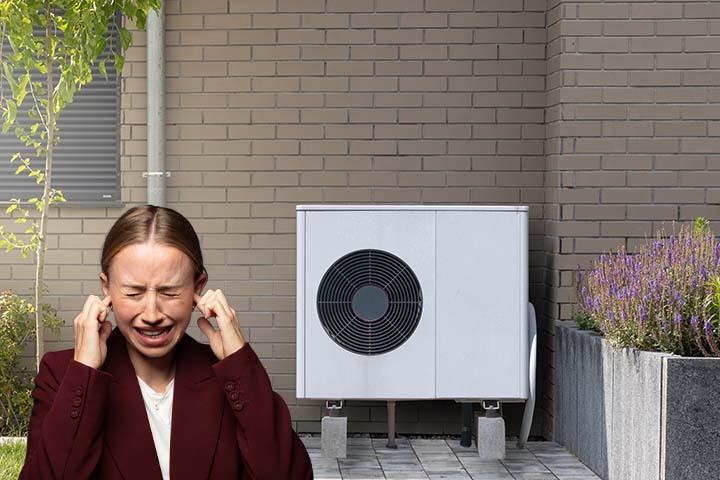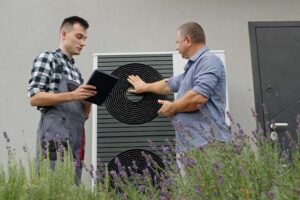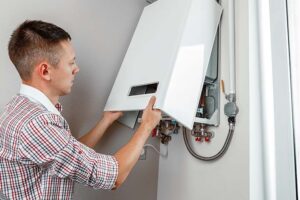Table of Contents
Air source heat pumps are growing in popularity throughout the UK. They are seen as a cleaner, greener area for traditional heating systems. But many household owners have a common concern: Are air source heat pumps noisy?
In this blog, we will look deeply at the noise from the heat pump, what is the reason for this, and what the UK rules say about it.
We’ll also answer popular questions like:
- Are heat pumps noisy for neighbours?
- Why is my air source heat pump so noisy?
- Are air source heat pumps noisy in the winter?
- Are air source heat pumps noisy at night?
- What are the rules about heat pump noise in the UK?
- Can you hear a heat pump inside the house?
Let’s dive in and clear up the noise about noise!
What Is an Air Source Heat Pump?
An air source draws heat from the outer air, even in cold weather, and uses it to heat the home and water. It acts as a refrigerator, but vice versa.
Instead of pushing the hot air out, it gives warmth. Most heat pumps are kept out, often next to a house or on a flat roof.
Air Source Heat Pump Grants
So, Are Air Source Heat Pumps Noisy?
The short answer is: not really—but it depends.
All machines that move air or fluids make some noise. That includes fridges, air conditioners, and yes, heat pumps. But air source heat pumps are not loud enough to disturb daily life for most people.
A modern, properly installed heat pump typically produces 40-60 decibels of sound. That’s about the same as a quiet conversation or background music.
But there are factors that can make them seem louder or quieter. Let’s explore.
What Affects the Noise Level of a Heat Pump?
1. Brand and Model
Just like cars or washing machines, some brands are quieter than others. Manufacturers often work hard to reduce noise through better design. Premium models tend to use quieter fans, compressors, and insulated enclosures.
If noise is a top concern, ask your installer about the quietest models available. Some ultra-quiet heat pumps can be as low as 35 dB at a distance of 1 metre.
2. Installation Location
Where you place your heat pump matters a lot. If it’s close to a wall, under a window, or in a corner, the sound may bounce and seem louder. If it’s next to a bedroom window, you may hear it more at night when everything else is quiet.
Good placement helps reduce noise. Installers usually advise putting it away from bedrooms or living room windows.
3. Surrounding Structures
Hard surfaces like brick walls can reflect sound. Bushes or fences may help muffle it. If your heat pump is in a narrow alley or echo-prone spot, it may seem louder.
Adding sound barriers or acoustic panels may help reduce the noise impact.
4. The Weather
Yes, weather plays a role. In colder weather, your heat pump works harder to gather heat from the air. That can mean:
- The fan runs faster
- The compressor works more often
- Defrost cycles create clicking or hissing sounds
So yes, air source heat pumps can be noisier in winter than in summer.
5. How It’s Used
If your heating system is always working at full capacity, it’ll be louder. Proper sizing helps ensure it doesn’t run more than needed. Undersized systems may work harder and make more noise.
How Loud Is a Heat Pump? (Typical Decibel Levels)
To put things in perspective, here’s how the sound of a heat pump compares to everyday noises:
| Sound Source | Decibels (dB) |
|---|---|
| Rustling leaves | 20 dB |
| Whisper | 30 dB |
| Quiet heat pump (1m distance) | 35–45 dB |
| Average heat pump (1m distance) | 45–55 dB |
| Normal conversation | 60 dB |
| Vacuum cleaner | 70 dB |
As you can see, even an average heat pump is quieter than a normal conversation and much quieter than a vacuum.
Still, a constant low-level noise can be noticeable, especially at night.
Are Air Source Heat Pumps Noisy at Night?
Many homeowners ask: Are air source heat pumps noisy at night?
At night, the world is quieter. That makes even low noises easier to hear. So, even if the heat pump isn’t louder than during the day, it might seem more noticeable.
Most modern heat pumps have a night mode or quiet setting, which reduces fan and compressor speed during sleeping hours. If yours has this feature, use it.
Also, ensure your pump is not right next to a bedroom window. Strategic placement and good insulation make a big difference.
Are Heat Pumps Noisy for Neighbours?
This is a big concern, especially in semi-detached or terraced homes.
A well-installed, modern heat pump should not disturb neighbours. But again, placement is key. If your unit faces a neighbour’s window or wall, the sound might carry more easily.
UK rules help prevent this. More on that below.
If your neighbour says they can hear your heat pump, it may be:
- Installed too close to their property
- Facing in a way that reflects sound toward them
- Working harder than it should
In these cases, ask a technician to check it.
Why Is My Air Source Heat Pump So Noisy?
If your heat pump seems loud, it could be:
- A mechanical issue (e.g. loose parts, debris in the fan)
- Icy buildup in winter that causes strain
- Old or low-quality equipment
- Poor installation or bad location
Get it checked by a qualified technician. You may just need some basic maintenance to fix the issue.
Heat Pump Noise Regulations in the UK
So, what does the law say?
In the UK, Permitted Development Rights allow you to install one air source heat pump without planning permission, as long as it meets certain rules. One of the key rules is about noise.
UK Planning Rules: Microgeneration Certification Scheme (MCS)
According to MCS Planning Standards:
- The noise level must not exceed 42 dB at a distance of 1 metre from your neighbour’s nearest habitable room window.
- This is called the “Permitted Development Noise Limit”.
- If it exceeds this, you will need planning permission.
This is where good installers come in. They do a noise assessment before installation to make sure your heat pump meets the rules.
Some councils may have their own rules, but most follow these national standards.
Can You Hear a Heat Pump Inside the House?
In most cases, you should not hear your heat pump indoors. The outdoor unit stays outside. The only part inside is the control unit or indoor heat exchanger.
If you hear noises indoors:
- It could be from poor pipe insulation
- The walls or floor may be transmitting vibration
- The fan may be louder than normal due to age or fault
Again, these are usually easy to fix.
Tips to Reduce Heat Pump Noise
Want your heat pump to be even quieter? Try these:
- Choose a low-noise model (some are under 40 dB!)
- Place it away from windows and neighbours
- Use sound-dampening pads or mounts
- Install barriers or fences (non-reflective)
- Keep it well maintained
- Use quiet or night mode if available
Final Thoughts
So, are air source heat pumps noisy? Not really. They make some sound, like any machine. But most modern models are quiet, efficient, and neighbour-friendly—especially when installed correctly.
The key is choosing the right model, placing it smartly, and staying within UK noise rules. If you do that, your heat pump should give you warmth without the whine.
Frequently Asked Questions
Not usually. When installed to meet UK planning rules (less than 42 dB at 1m from a neighbour’s window), they are quiet enough not to disturb. Proper placement helps.
Possible reasons include mechanical faults, ice buildup in winter, poor installation, or a low-end model. Have a technician inspect it.
Yes, they can be slightly louder in winter because they work harder. You may also hear defrost cycles. However, they should not be disturbingly loud.
At night, the environment is quieter, so any noise seems more noticeable. Use night mode if your unit has one, and avoid placing it near bedrooms.
Not usually. If your heat pump meets the noise limit of 42 dB at 1m from a neighbour’s window, it falls under Permitted Development Rights. Otherwise, you may need permission.



